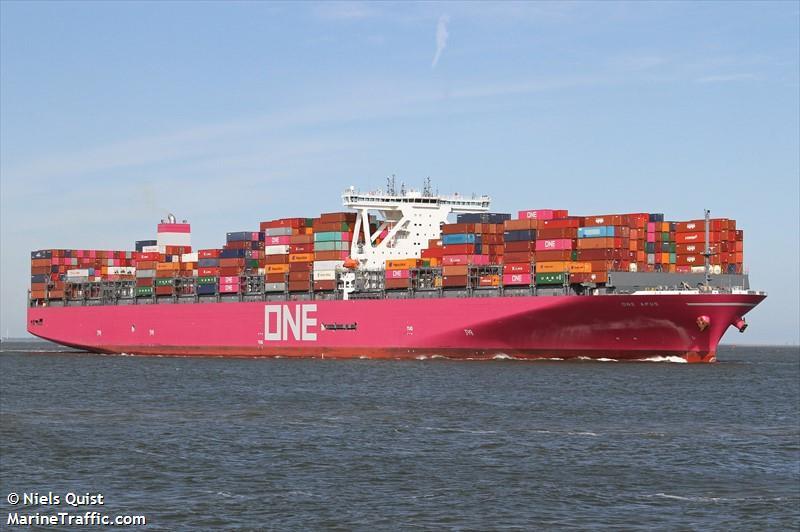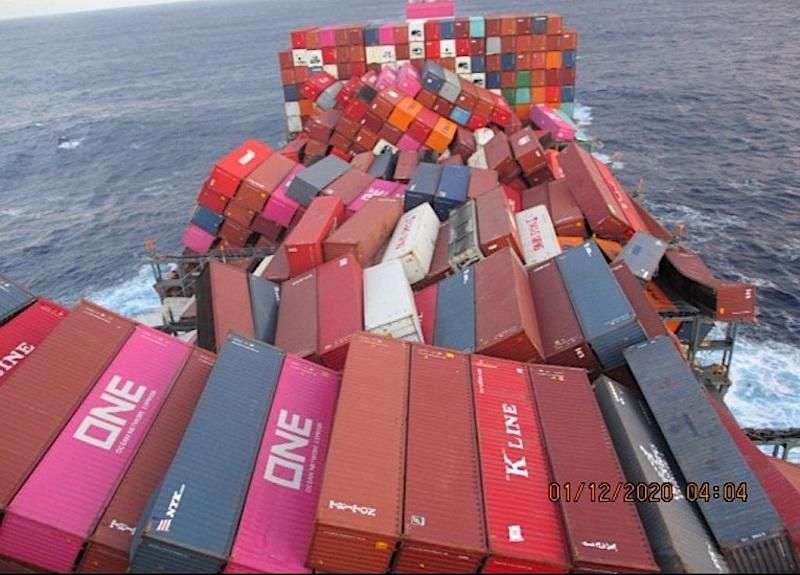By Mike Schuler of GCaptain,
The owners and managers of the containership that lost a record number of containers overboard as it sailed across the Pacific Ocean towards Long Beach have provided an update on the status of the vessel as it now heads for Japan. The update revised down the number of containers either lost or damaged from the original estimate of 1,900, to now 1,816 units, of which now 64 are believed to be Dangerous Goods containers.
The vessel continues to proceed to the Port of Kobe, Japan with an estimated arrival of December 7 or 8.
The ONE Apus suffered the incident after encountering severe weather on Monday, November 30, during its voyage from Yantian, China to Long Beach, California. The vessel was approximately 1,600 nautical miles northwest of Hawaii at the time.
The ONE Apus is a 14,000 TEU containership built in 2019 measuring 364-meters in length and sailing under the Japanese flag. The vessel is operated by Japan’s Ocean Network Express on the Far East Pacific 2 (FP2) Service.
“The priority remains on getting the vessel and crew safely to port. Once berthed, it’s expected to take some time to offload the dislodged containers that remain on board. Then, a thorough assessment will be made on the exact number and type of containers that have been lost or damaged,” the update said.
Today’s update from Chidori Ship Holding LLC and NYK Shipmanagement Pte Ltd, the owner and manager, respectively, provides some additional details about the incident and what will happen moving forward.
The update said weather at the time was reported as wind force 4 on the Beaufort Wind Scale, corresponding to 13-18 mph winds, with north-westerly seas of 5 to 6 meters and a “long high swell”.
Weather maps around the time of the incident, however, show significant wave heights of up to 16 meters associated with the low pressure system.
“A notification was sent to the JRCC in Honolulu and Guam with maritime navigational warnings subsequently broadcast. We are continuing to liaise with the JRCC in Honolulu, who have advised that there have not been sightings of any containers as yet,” the update said.
It’s becoming more and more clear that this is likely the worst weather-related container loss in history. To give you a reference, assuming each container in this case is actually 40-foot, the 1,816 lost or damaged units could, at the high end of the spectrum, represent approximately 3,600 twenty-foot equivalent units (TEU), equivalent to about a quarter of the ship’s entire 14,000 TEU carrying.
Second Incident
The incident comes about one month another ONE Line-operated ship of 14,000 TEU-capacity, the ONE Aquila, also suffered collapsed containers during severe weather during its transpacific crossing from Yantian to Long Beach. In that incident, ONE Line said only a “a limited number” of containers were impacted, and the vessel returned to service within about a week of its arrival in port.
Today’s update also offered an FAQ addressing the coincidence and provided an update on the ONE Apus investigation:
“A root cause-analysis and investigation is in process and will be continued once the vessel arrives in Port. All and any concerns will be addressed as a part of the investigation,” it said.
The FAQ continues:
“The vessel’s operational equipment, cargo gear, and propulsion machinery are in good condition and the officers and ratings are highly motivated, experienced, loyal and well-trained seafarers. The root cause analysis and full investigation will look at all aspects of the situation, including the vessel’s routing, loading, equipment and fitness for purpose in very extreme weather. We must ensure no such loss occurs again.”
Containers Lost At Sea
According to the World Shipping Council, in 2019 the liner shipping industry transported approximately 226 million containers containing about $4 trillion worth of cargo on over 6,000 containerships.
In its latest tally of containers lost at sea, the WSC estimates that over the last 12 years an average of 1,382 containers are *lost overboard* from ships each year, not counting for catastrophic incidents which it defines as 50 or more containers in a single event.
“The conclusion after twelve years is that more than half of all containers lost at sea are attributable to the limited number of major incidents that have occurred during those years,” the WSC said in releasing its last report.
Other notable containers losses at sea, according to the WSC:
- MOL Comfort – 2013 – 4,293 containers lost
- Rena – 2011 – approximately 900 containers lost
- El Faro – 2015 – 517 containers lost

